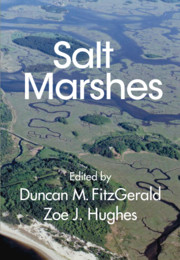Book contents
- Salt Marshes
- Salt Marshes
- Copyright page
- Contents
- Contributors
- Acknowledgments
- 1 State of Salt Marshes
- Part I Marsh Function
- 2 Salt Marsh Distribution, Vegetation, and Evolution
- 3 Salt Marsh Formation
- 4 Salt Marsh Hydrodynamics
- 5 Community Ecology of Salt Marshes
- 6 The Role of Marshes in Coastal Nutrient Dynamics and Loss
- Part II Marsh Dynamics
- Part III Marsh Response to Stress
- Index
- References
4 - Salt Marsh Hydrodynamics
from Part I - Marsh Function
Published online by Cambridge University Press: 19 June 2021
- Salt Marshes
- Salt Marshes
- Copyright page
- Contents
- Contributors
- Acknowledgments
- 1 State of Salt Marshes
- Part I Marsh Function
- 2 Salt Marsh Distribution, Vegetation, and Evolution
- 3 Salt Marsh Formation
- 4 Salt Marsh Hydrodynamics
- 5 Community Ecology of Salt Marshes
- 6 The Role of Marshes in Coastal Nutrient Dynamics and Loss
- Part II Marsh Dynamics
- Part III Marsh Response to Stress
- Index
- References
Summary
Salt marshes occupy the intertidal zone and support rich ecosystems of salt-tolerant plants and other biota (Costanza et al. 1997; Mitsch and Gosselink, 2000). These ecosystems contain channel networks that dissect marsh platforms, just as terrestrial river networks dissect hillslopes. In contrast to upland landscapes, marsh platforms are very low relief, are inundated by tides, and the channels that dissect them experience bidirectional flows (D’Alpaos et al. 2005; Hughes, 2012; Coco et al. 2013). These conditions are also present in intertidal mudflats, yet marsh platforms sit at different elevations (Fagherazzi et al. 2006), have different characteristics of their channel networks (Rinaldo et al. 1999a, 1999b; Kleinhans et al. 2009), and different hydrodynamics (Fagherazzi et al. 2012). The fundamental difference is the presence of marsh vegetation which has a profound effect on flow within marsh canopies (Nepf, 2012).
- Type
- Chapter
- Information
- Salt MarshesFunction, Dynamics, and Stresses, pp. 53 - 81Publisher: Cambridge University PressPrint publication year: 2021
References
- 8
- Cited by

